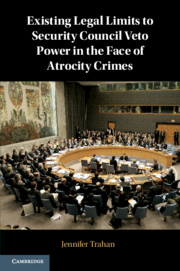Book contents
- Existing Legal Limits to Security Council Veto Power in the Face of Atrocity Crimes
- Existing Legal Limits to Security Council Veto Power in the Face of Atrocity Crimes
- Copyright page
- Contents
- Foreword
- Acknowledgments
- Introduction
- 1 The Origins and History of the Veto and Its Use
- 2 Acting in the Face of Atrocity Crimes
- 3 Initiatives to Voluntarily Restrain Veto Use in the Face of Atrocity Crimes
- 4 Questioning the Legality of Veto Use in the Face of Genocide, Crimes against Humanity, and/or War Crimes
- 5 Case Studies
- Index
Introduction
Published online by Cambridge University Press: 15 August 2020
- Existing Legal Limits to Security Council Veto Power in the Face of Atrocity Crimes
- Existing Legal Limits to Security Council Veto Power in the Face of Atrocity Crimes
- Copyright page
- Contents
- Foreword
- Acknowledgments
- Introduction
- 1 The Origins and History of the Veto and Its Use
- 2 Acting in the Face of Atrocity Crimes
- 3 Initiatives to Voluntarily Restrain Veto Use in the Face of Atrocity Crimes
- 4 Questioning the Legality of Veto Use in the Face of Genocide, Crimes against Humanity, and/or War Crimes
- 5 Case Studies
- Index
Summary
This book examines veto use by the permanent members of the UN Security Council while atrocity crimes are being committed – genocide, crimes against humanity, and/or war crimes. The veto power, conferred by UN Charter Article 27(3), allows any one of the five permanent members – the US, the UK, Russia, China, or France – to block a substantive resolution within the Council by casting a negative vote. Both today, and in the past, permanent members use, or have used, their veto power to block resolutions, including those designed to curtail or alleviate the commission of atrocity crimes, with dire consequences sometimes resulting on the ground. For example, when chemical weapons inspections that would have attributed responsibility to the side using the weapons in Syria are blocked by the veto and chemical weapons attacks continue, veto use appears to be costing lives.
- Type
- Chapter
- Information
- Publisher: Cambridge University PressPrint publication year: 2020

